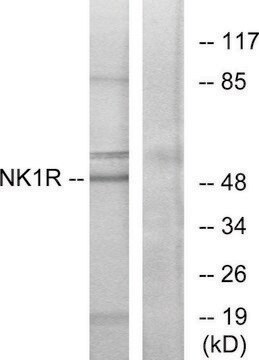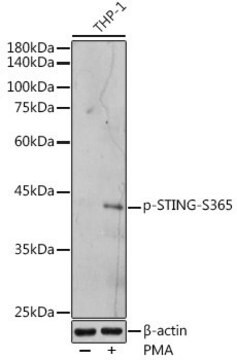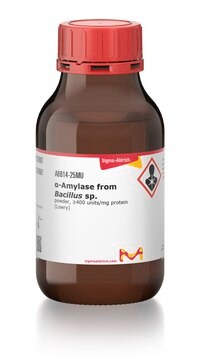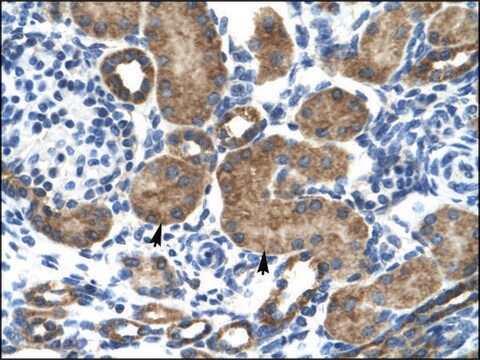おすすめの製品
由来生物
mouse
品質水準
抗体製品の状態
ascites fluid
抗体製品タイプ
primary antibodies
クローン
4F5, monoclonal
化学種の反応性
rat, human, monkey
メーカー/製品名
Chemicon®
テクニック
ELISA: suitable
immunocytochemistry: suitable
immunohistochemistry: suitable
radioimmunoassay: suitable
アイソタイプ
IgM
NCBIアクセッション番号
輸送温度
dry ice
ターゲットの翻訳後修飾
unmodified
遺伝子情報
human ... GRIK1(2897)
特異性
Recognizes an epitope common to Glutamate Receptors 5, 6 and 7. No reactivity seen to GluR1, GluR2, GluR3 or GluR4.
免疫原
Recombinant fusion protein TrpE-GluR5
アプリケーション
Research Category
ニューロサイエンス
ニューロサイエンス
Research Sub Category
神経伝達物質及び受容体
神経伝達物質及び受容体
Anti-Glutamate Receptor 5, 6, 7 Antibody, clone 4F5 detects level of Glutamate Receptor 5 & has been published & validated for use in ELISA, IC, IH, RIA.
Immunohistochemistry on 4% paraformaldehyde fixed tissue:1:1,000-1:2,000 Immunocytochemistry
ELISA
RIA
Optimal working dilutions must be determined by end user.
ELISA
RIA
Optimal working dilutions must be determined by end user.
物理的形状
Ascites. Liquid. Contains no preservative.
保管および安定性
Maintain at -20°C in undiluted aliquots for up 12 months after date of receipt. Avoid repeated freeze/thaw cycles.
法的情報
CHEMICON is a registered trademark of Merck KGaA, Darmstadt, Germany
免責事項
Unless otherwise stated in our catalog or other company documentation accompanying the product(s), our products are intended for research use only and are not to be used for any other purpose, which includes but is not limited to, unauthorized commercial uses, in vitro diagnostic uses, ex vivo or in vivo therapeutic uses or any type of consumption or application to humans or animals.
適切な製品が見つかりませんか。
製品選択ツール.をお試しください
保管分類コード
10 - Combustible liquids
WGK
WGK 1
引火点(°F)
Not applicable
引火点(℃)
Not applicable
適用法令
試験研究用途を考慮した関連法令を主に挙げております。化学物質以外については、一部の情報のみ提供しています。 製品を安全かつ合法的に使用することは、使用者の義務です。最新情報により修正される場合があります。WEBの反映には時間を要することがあるため、適宜SDSをご参照ください。
Jan Code
MAB379:
試験成績書(COA)
製品のロット番号・バッチ番号を入力して、試験成績書(COA) を検索できます。ロット番号・バッチ番号は、製品ラベルに「Lot」または「Batch」に続いて記載されています。
Toxic effects of domoic acid in the seabream Sparus aurata.
Nogueira, I; Lobo-da-Cunha, A; Afonso, A; Rivera, S; Azevedo, J; Monteiro, R; Cervantes et al.
Marine drugs null
Absence of neurotoxic effects in leopard sharks, Triakis semifasciata, following domoic acid exposure.
P Schaffer, C Reeves, D R Casper, C R Davis
Toxicon null
Selective distribution of kainate receptor subunit immunoreactivity in monkey neocortex revealed by a monoclonal antibody that recognizes glutamate receptor subunits GluR5/6/7
Huntley, G W, et al
The Journal of Neuroscience, 13, 2965-2981 (1993)
Duygu Gok Yurtseven et al.
Brain sciences, 10(9) (2020-09-17)
Nesfatin-1, identified as an anorexigenic peptide, regulates the energy metabolism by suppressing food intake. The majority of nesfatin-1-synthesizing neurons are concentrated in various hypothalamic nuclei, especially in the supraoptic (SON), arcuate (ARC) and paraventricular nuclei (PVN). We tested the hypothesis
David R Micklem et al.
BMC biotechnology, 14, 57-57 (2014-06-24)
The dose-response relationship is a fundamental pharmacological parameter necessary to determine therapeutic thresholds. Epi-allelic hypomorphic analysis using RNA interference (RNAi) can similarly correlate target gene dosage with cellular phenotypes. This however requires a set of RNAi triggers empirically determined to
ライフサイエンス、有機合成、材料科学、クロマトグラフィー、分析など、あらゆる分野の研究に経験のあるメンバーがおります。.
製品に関するお問い合わせはこちら(テクニカルサービス)








